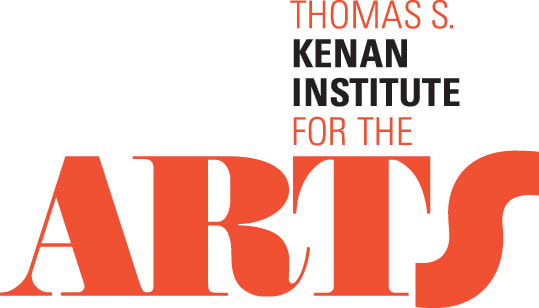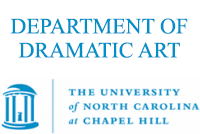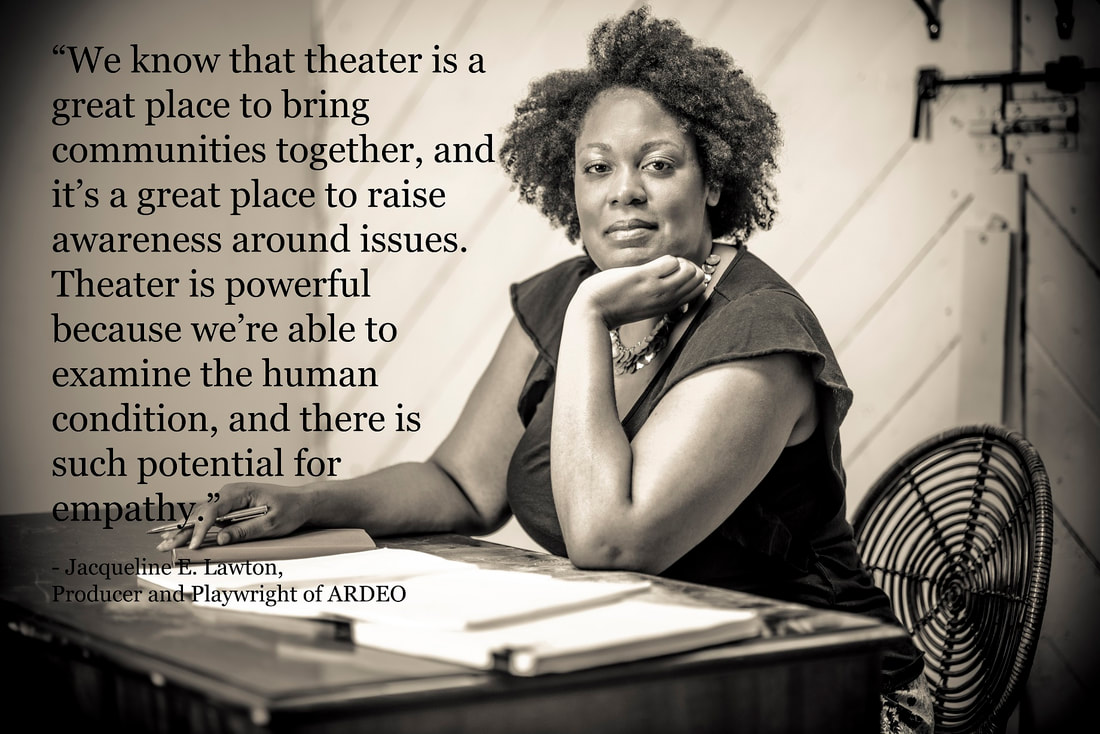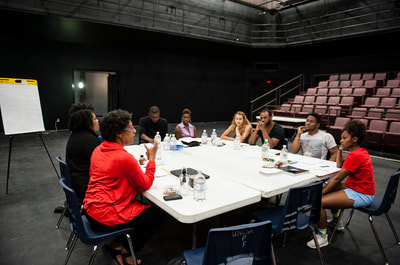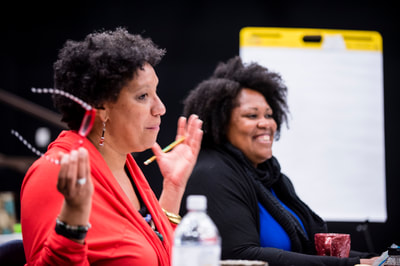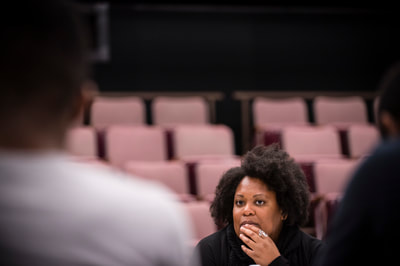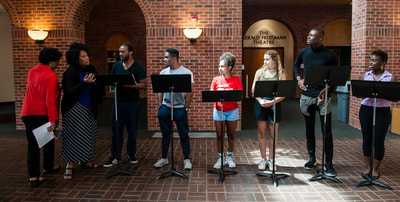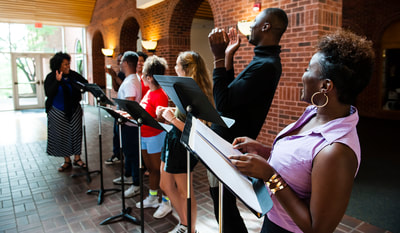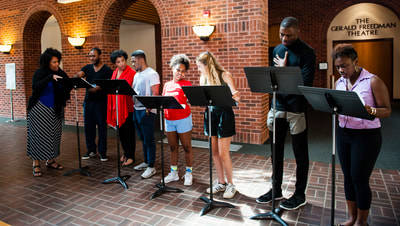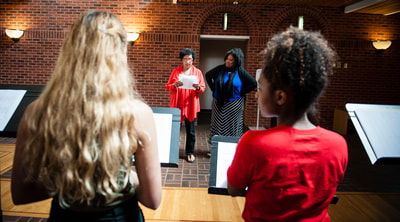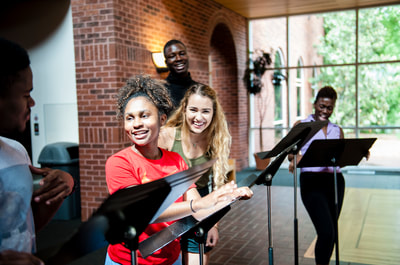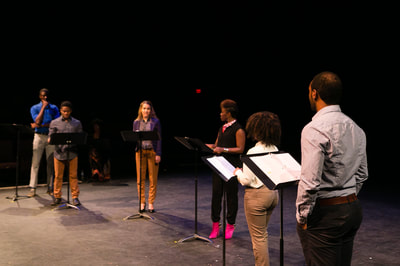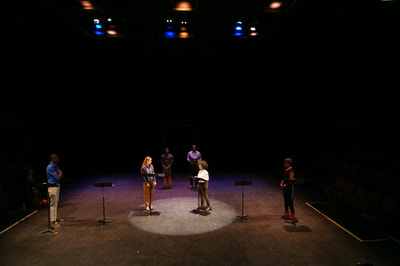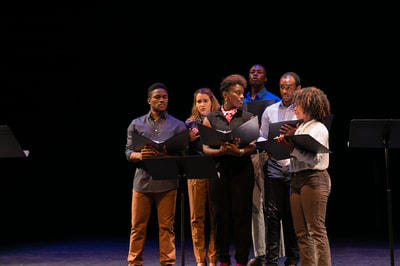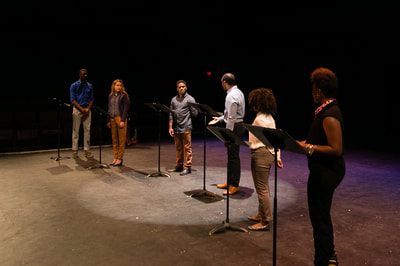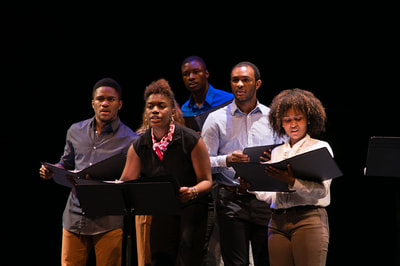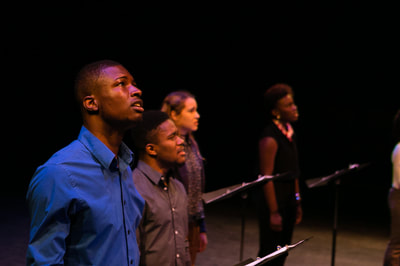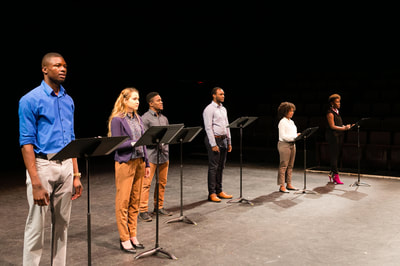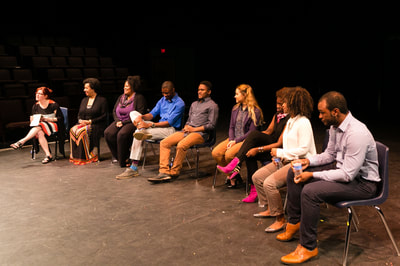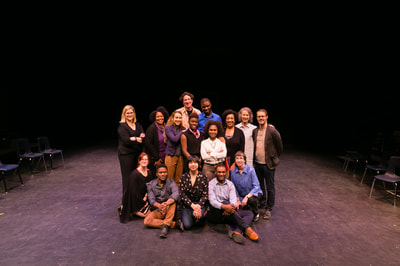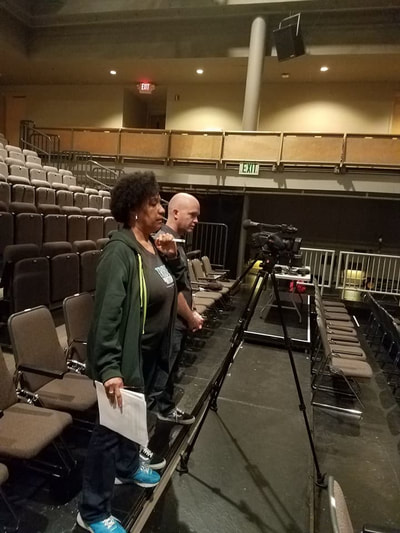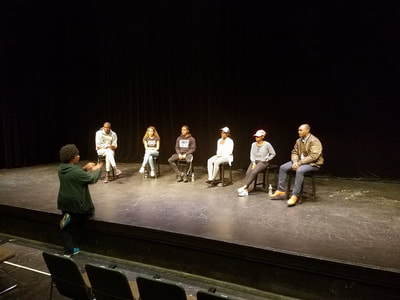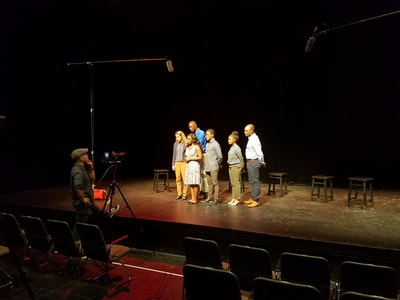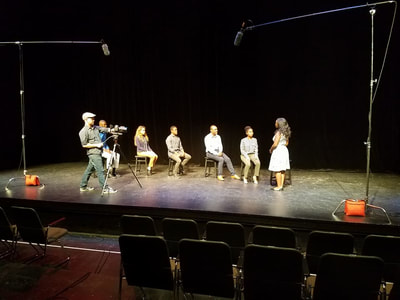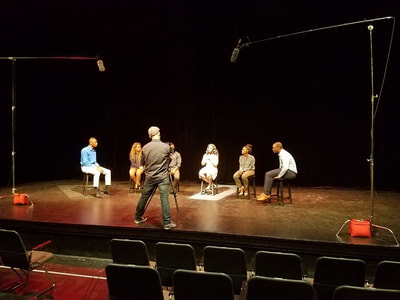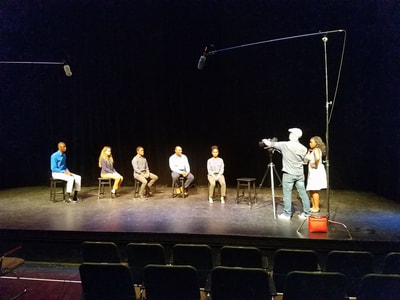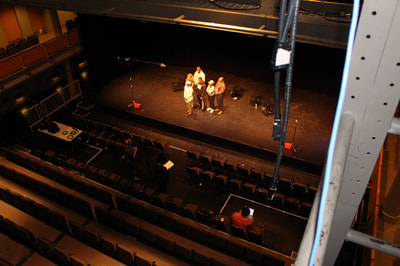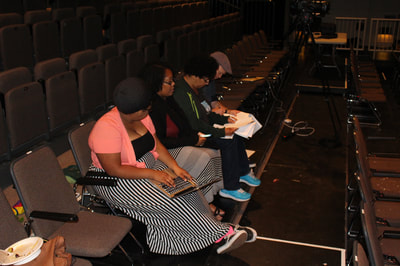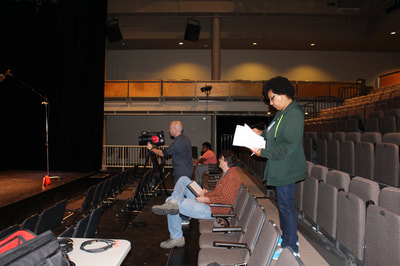ARDEO

ARDEO is a one act play inspired by research and personal narratives of health practitioners and patients at UNC-CH’s North Carolina’s Jaycee Burn Center. This play explores how patients and doctors communicate with each other; how health practitioners communicate with the public; and how theatre artists can be of service to patients, doctors and the larger public. From the perspective of scientists and medical providers, the involvement of the dramatic arts represents a unique opportunity to appreciate the meaning of one’s work and to gain new insights and perspectives regarding its relevance. Narrative medicine not only serves the public health sector and works to improve the effectiveness of care, but it also offers as a healing tool for patients in recovery. This project is sponsored by a grant from the Kenan Creative Collaboratory and the UNC Burn Center.
ARDEO Press
ARDEO Explores Stories of Burn Survivors, Care Providers
"UNC assistant professor of dramatic art and playwright Jacqueline Lawton has always had an appreciation for the crossroads of art and science, a theme that repeatedly finds its way into her work. She believes in the power of narrative medicine — the idea of patients telling their stories, listening to their bodies and becoming empowered in their journey toward recovery. And theater is the perfect venue for that to happen, she said." Click here to read the rest of the article.
ARDEO: From Page to Stage
"When I returned to Chapel Hill, I shared this idea with Adam Versenyi (chair of the Department of Dramatic Art) and he introduced me to Bruce Cairns, the director of the North Carolina Jaycee Burn Center. Together, Dr. Cairns and I began to think of ways to collaborate. Our opportunity came in April 2015 when I applied for and was awarded a Kenan Creative Collaboratory grant to research, write, and develop ARDEO, a one-act play inspired by personal narratives of healthcare practitioners and patients at the Jaycee Burn Center." Click here to read the rest of the article.
ARDEO: Chronicling the Lived Experience of Injury from Patient to Physician to Public
"Jacqueline Lawton’s ARDEO is a short play rooted in these principles of narrative medicine. While it demonstrates elements of documentary theatre—dialogue built from interviews and historical and disciplinary research—it is a poetic rendering of the flow of action in which patients, caregivers, and healthcare providers move at the North Carolina Jaycee Burn Center. Actors embody the sights and sounds of the unit, as well as the individual patients, caregivers, and medical personnel. We look into individual faces as they tell of heartbreak, terror, and courage, and then they morph into a backdrop of activity that crackles with the pressure of medical assessment and treatment." Click here to read the rest of the article.
ARDEO: Exploring Medical Humanities through Theatre
This interview is with Nicole Damari, a UNC–Chapel Hill medical student who helped craft research questions and took and transcribed copious notes for Lawton’s creation of ARDEO. Click here to read the rest of the interview.
"UNC assistant professor of dramatic art and playwright Jacqueline Lawton has always had an appreciation for the crossroads of art and science, a theme that repeatedly finds its way into her work. She believes in the power of narrative medicine — the idea of patients telling their stories, listening to their bodies and becoming empowered in their journey toward recovery. And theater is the perfect venue for that to happen, she said." Click here to read the rest of the article.
ARDEO: From Page to Stage
"When I returned to Chapel Hill, I shared this idea with Adam Versenyi (chair of the Department of Dramatic Art) and he introduced me to Bruce Cairns, the director of the North Carolina Jaycee Burn Center. Together, Dr. Cairns and I began to think of ways to collaborate. Our opportunity came in April 2015 when I applied for and was awarded a Kenan Creative Collaboratory grant to research, write, and develop ARDEO, a one-act play inspired by personal narratives of healthcare practitioners and patients at the Jaycee Burn Center." Click here to read the rest of the article.
ARDEO: Chronicling the Lived Experience of Injury from Patient to Physician to Public
"Jacqueline Lawton’s ARDEO is a short play rooted in these principles of narrative medicine. While it demonstrates elements of documentary theatre—dialogue built from interviews and historical and disciplinary research—it is a poetic rendering of the flow of action in which patients, caregivers, and healthcare providers move at the North Carolina Jaycee Burn Center. Actors embody the sights and sounds of the unit, as well as the individual patients, caregivers, and medical personnel. We look into individual faces as they tell of heartbreak, terror, and courage, and then they morph into a backdrop of activity that crackles with the pressure of medical assessment and treatment." Click here to read the rest of the article.
ARDEO: Exploring Medical Humanities through Theatre
This interview is with Nicole Damari, a UNC–Chapel Hill medical student who helped craft research questions and took and transcribed copious notes for Lawton’s creation of ARDEO. Click here to read the rest of the interview.
ARDEO Rehearsal Photos by Christine Rucker
In May of 2016, we had a weeklong new play development workshop and rehearsal. With Kathryn Hunter-Williams (Senior Lecturer in the Department of Dramatic Art) as director and David Navalinsky (Director of Undergraduate Production) as lighting designer and sound operator, we put the play on its feet. I was able to develop the script even further with our talented cast, which included Nikyla Boxley, Tre Dukes, Mariah Guillmette, Devin Kessler, Mekhai Lee, and Hassiem Muhammad, all students from the University of North Carolina School of the Arts. It was amazing to bring the play to life.
ARDEO Reading Photos
With lighting design by David Navalisnky, ARDEO was presented for two public readings. Both readings were followed by post show discussions led by Jules Odendahl-James, and welcomed a combined audience of 45 people.
ARDEO Film Shoot
There was so much interest in the script that we just filmed a staged reading of it. The production team and original cast was joined by filmmaker Alex Maness for a day long film shoot.
ARDEO: The Film
ARDEO from Alex Maness on Vimeo.
ARDEO
Written by Jacqueline E. Lawton
Directed by Kathryn Hunter-Williams
Dramaturgy by Jules Odendahl-James
Lighting design by David Navalinsky
Director of Photography and Editing by Alex Maness
Featuring Nikyla Boxley, Tre Dukes, Mariah Guillmette, Devin Kessler, Mekhai Lee, and Hassiem Muhammad
Special thanks to Dr. Bruce Cairns, Shirley Massey, Nicole Damari, Oyoana Allende, Conny Morrison, Lorna Perry, Blake Tedder, Rev. Sharon L. Thompson-Journigan, Christopher White, Monika Atanesian, Steven Chewning, Anita Fields, Char-Norie Poteat , Janet “Cricket” Scovil , Chris Trum, Jen Rogers, Stacy Payne, Jamie Linens Strickland, Frank Bermel, Corey Madden, Susan Brittain, Candy Martinez, Carl Forsman, Josh Foldy, and the Thomas S. Kenan Institute for the Arts.
ARDEO was sponsored by the generous support of the North Carolina Jaycee Burn Center, the Kenan Creative Collaboratory, and the UNC Department of Dramatic Art.
Written by Jacqueline E. Lawton
Directed by Kathryn Hunter-Williams
Dramaturgy by Jules Odendahl-James
Lighting design by David Navalinsky
Director of Photography and Editing by Alex Maness
Featuring Nikyla Boxley, Tre Dukes, Mariah Guillmette, Devin Kessler, Mekhai Lee, and Hassiem Muhammad
Special thanks to Dr. Bruce Cairns, Shirley Massey, Nicole Damari, Oyoana Allende, Conny Morrison, Lorna Perry, Blake Tedder, Rev. Sharon L. Thompson-Journigan, Christopher White, Monika Atanesian, Steven Chewning, Anita Fields, Char-Norie Poteat , Janet “Cricket” Scovil , Chris Trum, Jen Rogers, Stacy Payne, Jamie Linens Strickland, Frank Bermel, Corey Madden, Susan Brittain, Candy Martinez, Carl Forsman, Josh Foldy, and the Thomas S. Kenan Institute for the Arts.
ARDEO was sponsored by the generous support of the North Carolina Jaycee Burn Center, the Kenan Creative Collaboratory, and the UNC Department of Dramatic Art.
